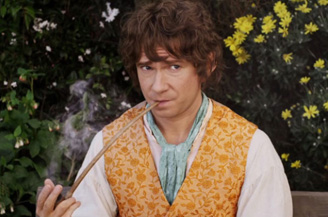The 400-Word Review: The Hobbit
By Sean Collier
December 15, 2012
BoxOfficeProphets.com

J.R.R. Tolkien’s preamble to the weighty Lord of the Rings trilogy was an accessible, delightful and swift book that whisked the reader into his Middle Earth quickly and effectively. The Hobbit is shorter than the books that follow, and written at a level more appropriate for a broad audience; many children discovered it at a young age, and readers unfamiliar or uninterested in fantasy can still handle it easily.
So the worst of the unfortunate decisions, then, was to make The Hobbit into a trilogy. Half the joy in the story is its brisk pace; Bilbo Baggins is thrust into his adventure with blinding speed. The audience for An Unexpected Journey, though, has plenty of time to contemplate, as this first chapter takes an unwieldy 169 minutes to complete.
By this standard, Return of the King should’ve been ten movies.
In the first half of the film, frequent diversions to past and/or future events are inserted to pad the running time. The introduction contains an extended flashback, told in the greater context of a flash forward. Much of these extracurricular segments serve only to elucidate references of interest to dedicated fans only. Indeed, the whole operation seems like fanservice; Peter Jackson and his compatriots have provided a feast for Tolkien devotees and an overdone turkey for general viewers.
The film’s second half is an escalating series of battle sequences; these are entertaining, but can’t compete with the truly epic sequences of the original trilogy. The only reprieve — and the easy highlight — is the much-hyped meeting between Martin Freeman’s Bilbo and Andy Serkis’ Gollum.
The other scrutinized error in judgement, of course, was the decision to film The Hobbit at a high frame rate. As a concept, this isn’t absurd, and is likely the direction in which film is headed; the error, though, was to introduce this new technology on a fantasy film, where the enhanced clarity makes the world of Middle Earth look storybook at best and phony at worst.
An Unexpected Journey is not a bad film, but the ambitions of its creators made it nearly buckle under its own weight. It’s probably still worth seeing, as spectacle and curiosity; the shame is how much more it might’ve been.